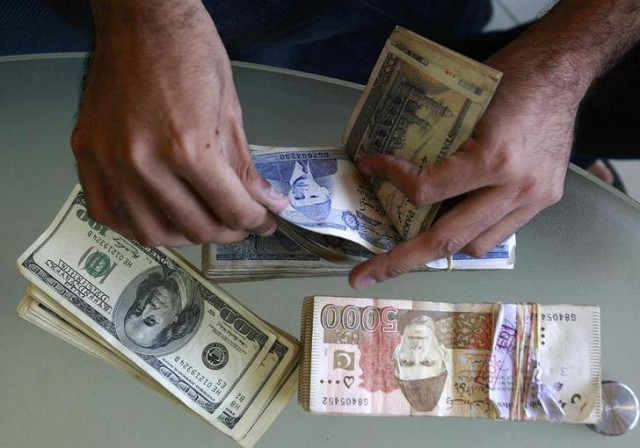In just one year: Government’s debts, liabilities grow to Rs14.54tr
Share of short-term loans increases to 43 per cent, further deepening dependence on banks

Share of short-term loans increases to 43 per cent, further deepening dependence on banks. PHOTO: REUTERS
As against the Rs13.2 trillion level a year ago, the federal government’s domestic debt and liabilities increased to Rs14.54 trillion by December 2016, showing 10.3% growth in just one year, said the State Bank of Pakistan (SBP).
In absolute terms, there was an increase of Rs1.4 trillion in the domestic debt, as the government has miserably failed to broaden the tax net due to its political expediency.
Excluding liabilities, the domestic debt grew to Rs14.2 trillion by December. The central bank did not release the data of the external debt, which is also around Rs7 trillion.
The SBP data further revealed structural changes that took place in the country’s domestic debt profile during the last one year. It showed that the share of long-term permanent debt in the total domestic debt was significantly reduced, which has heightened risks attached with rollover of maturing loans.
The share of government-backed bonds in its total domestic debt has decreased from 42.4% in December 2015 to about 36% by December 2016. This means frequent borrowings and more dependence on commercial banks to meet financing needs.
Due to the alarming increase in debt, more than one-third of the total budget is spent on servicing domestic debt, reducing space for spending on development and social sector.
In the last one year, share of the debt obtained through federal government bonds decreased by Rs781 billion to Rs4.5 trillion, according to the SBP. Similarly, the long-term debt share in total domestic debt declined from Rs5.93 trillion to Rs5.2 trillion.
Contrary to this trend, there was an increase of Rs1.2 trillion in the short-term domestic debt, a direct consequence of reduction in long-term debt. The share of short-term debt into total domestic debt and liabilities increased from just 35.7% to almost 43%.
But the Finance Ministry officials blamed the SBP for this increase. They said few months back the SBP policy statement suggested that due to high inflationary expectations the interest rates go up. Although, the central bank has now tamed down inflationary expectations, the commercial banks did not invest in long-term Pakistan Investment Bonds (PIB) during the Oct-Dec period of the last year, they added.
The banks were expecting 8.75% return on ten-year PIBs, which was almost 1% higher than the market rates, forcing the government to cancel the PIB auctions. In January, the government finally raised about Rs50 billion at 7.94% through the PIB.
It was a tradeoff between the cost and the risk, which was in line with the medium-term debt management strategy, said the Finance Ministry officials.
Pakistan has been borrowing heavily to meet budget needs, as it remains unable to broaden its extremely narrow tax base. The government, however, instead of improving its affairs got the definition of public debt changed from the Parliament.
After growing criticism and concerns raised by the international financial institutions about the long-term debt trajectory, Finance Minister Ishaq Dar recently wrote an article to explain the government’s point of view.
Published in The Express Tribune, February 8th, 2017.



1724319076-0/Untitled-design-(5)1724319076-0-208x130.webp)















COMMENTS
Comments are moderated and generally will be posted if they are on-topic and not abusive.
For more information, please see our Comments FAQ